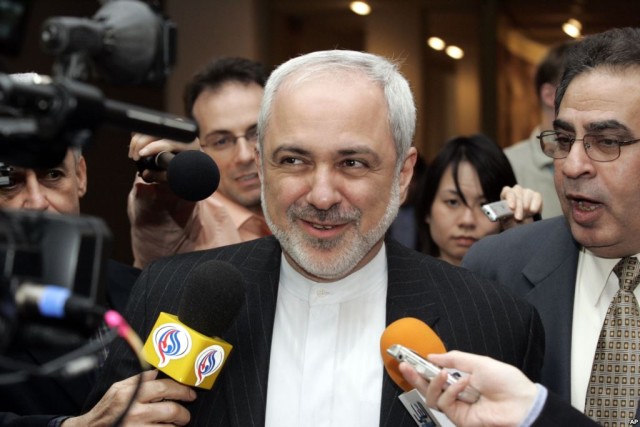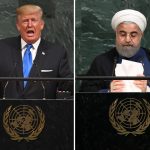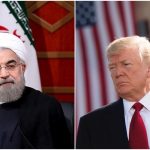by Jasmin Ramsey
“He may be the only person in the world who can telephone both Senator Dianne Feinsten and the Hezbollah Chief Hassan Nasrallah,” writes the veteran U.S. foreign affairs journalist Robin Wright about Iran’s famous foreign minister.
Her New Yorker profile is a fascinating read for anyone interested in Javad Zarif, whose mere smile so frightens the Israeli government and for those want to understand why Iran, faults and all, has been recently covered in American mainstream media as much more than — and perhaps not at all — a charter member of George W. Bush’s “axis of evil.”
We recently published an important piece by France’s former ambassador to Tehran, François Nicoullaud, who is probably more familiar with Iranian President Hassan Rouhani than with Zarif (Rouhani was Iran’s lead nuclear negotiator when Ambassador Nicoullaud was in Tehran). Nicoullaud’s post nonetheless made an important point related to Wright’s article:
One of [Rouhani’s] first acts as president was transferring Iran’s nuclear negotiating file from the Supreme National Security Council to the Ministry of Foreign Affairs. That enabled him to build a “dream team” of seasoned negotiators, perfectly comfortable with the codes and practices of their Western counterparts. Iran’s new and refined team has stood out in stark contrast to the collective clumsiness of the P5+1 negotiators, as in the early November 2013 episode, when four Wester foreign ministers rushed prematurely to Geneva, spurring the media to believe, mistakenly, that a deal would be signed. (It was signed 10 days later.)
The Iranian government hasn’t been remade since the June 2013 surprise election of Rouhani; it still contains hard-line and questionable cabinet picks by the president, such as Mostafa Pourmohammadi. But it’s hard to make a convincing argument today that Iran isn’t trying to change under Rouhani, who will mark his first anniversary as president in August.
That’s right, it hasn’t even been a year since that historic phone call between Rouhani and U.S. President Barack Obama last September in New York as the Iranian leader was being driven to JFK airport from the United Nations General Assembly where, in a furious series of meetings and speeches, he spelled out Iran’s new approach to the world.
Of course, Iran, which gives off a “striking impression” of “strategic loneliness” according to Wright, still has a long way to go on all fronts, and expectations are higher than ever.
Indeed, there has been considerable speculation about why the last round of nuclear negotiations between Iran and world powers ended in Vienna last Friday without the customary plenary. Al-Monitor’s Laura Rozen pointed to the “wide gaps” cited by a U.S. official, while the Guardian’s Julian Borger saw the parties hitting a wall. For his part, Zarif seemed as cool and collected as ever in his brief post-talks remarks. “Back from Vienna after tough discussions. Agreement is possible.But illusions need to go.Opportunity shouldn’t be missed again like in 2005,” he tweeted on May 17.
Whatever the reality of the situation (the negotiators have been remarkably disciplined about keeping the details of the talks under wraps), Rouhani needs a nuclear resolution. And as Wright’s profile shows, there may be no one in Iran better equipped or as determined as Zarif to achieve that goal. So can Zarif pull through? Stay tuned.





I think you raise one very important point and that is the disagreements the West has are with Iran’s leaders and not its people. It’s the same point that President Obama has been pushing, in that while sanctions have forced Iran to the bargaining table, it has come at some cost to the ordinary citizen. Unfortunately, the leadership of Iran has not shown much compassion for its own people, unless they participate as part of the ruling elite (which happens in just about any country it seems). I do also think you missed the mark slightly on the IAEA inspections. Historically Iran has allowed inspections of known facilities, but not of undeclared facilities. Also Iran has closed inspections down when it wanted to make a political point or didn’t received something, i.e. sanction relief. It’s the same playbook from which North Korea uses to some effect. Your last point about delivery system is spot on because Iran has purchased from North Korea several model designs that can boost a nuclear payload as far West as Israel (a must-have targeting package) and as far East as Saudi Arabia (it’s most significant regional opponent). So Iran has the bomb making expertise, its has a delivery system and its has the enrichment infrastructure. It just hasn’t built a bomb yet because it wants to see how much cash it can get from its frozen assets without giving up any liberalization of its internal policies.
Ultimately the Iranian leadership’s end game is to use the threat of nuclear capability to win back sanctions relief and maintain the integrity of domestic political structure without any outside interference. The only big question for the West is simply this: Can Iran’s leadership be trusted?
I think the evidence has been pretty overwhelming over the past three decades that the answer is no unfortunately.